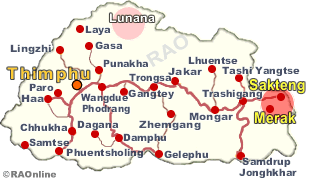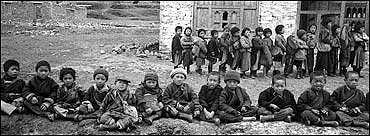|
Bhutan
- Ethnic Groups & People
|
 |
Bhutan's People Merak - Sakten |
|
 |
Bhutan Information |
|
|
 |
 |
|
A
closer look at the Brokpas of Merak - Sakten
|
 |
 |
| Despite
modernisation in various parts of Bhutan and the rapid pace of development
life for the Brokpas still remain simple. Tradition and culture passed
down over the ages still play a predominant part in the social life of
the Brokpas.
According
to the study, the Brokpa men and women share equal status and responsibilities
in supporting the family. |
|
"Women
seem to command a high degree of respect from their husbands and children
and they often function as the head of the family in deciding such matters
as marriage of their children, when to migrate and in taking charge of
the family finance," said the study. Women also represent their families
at all public functions- religious or social. And as men are away most
of the time, herding Yaks or trading their diary products, women attend
most of the local meetings. "In running an official errand and while making
important decisions pertaining to the community's welfare, a wife often
acts as proxy for her absent husband," said the study.
The
Brokpas have their own tradition and culture which rules births, deaths,
marriages and social life in the community. Polygamy and polyandry
are accepted and marriages are mostly arranged. According to the study
a typical Brokpa marriage would involve the meeting of a couple at a social
gathering. Following this three stages take place before the girl and boy
can be officially wed.
After consultation with the astrologer by
the groom's parents a visit to the bride's house with an offering of wine
takes place. This is called the Deunchang which is followed by the Barchang
period when ceremonial scarfs are offered to all the family mambers of
the bride. If the bride refuses the marriage, the girl's parents offer
Gyepchang, return drink.
Agreement to the proposal is sealed with the offering
of a Pangkhyep (a shawl) by the groom to the bride and a convenient wedding
date is set for the celebrations. Births are celebrated with fervour
as it means another addition to its future workforce. Death rituals on
the other hand border on the bizarre with different rituals for different
status groups within the community.
The
dead body of an ordinary brokpa is kept in the water for 3-6 days depending
upon the advise of the astrologers. Once it is removed from the water it
is chopped into 108 pieces and thrown into the river. However,
the body of a revered priest is often left in a far off open space to be
eaten by vultures while the lower caste people like the black smiths their
dead bodies are buried. Brokpas have their own dialect which is similar
to the dialect of the Tawangpas of Arunachal Pradesh but the pronunciations
are similar to dzongkha.
The language, the study said, has a Tibeto-Burman
root. Religion is another important aspect of life in Merak
and Sakten with the Brokpas belonging to the Gelugpa sect. Ama Jhomo remains
one of the chief deities of the Brokpas. Their belief in Ama Jhomo is further
strengthened by her death during which she is believed to have disappeared
into the heavenly realms without suffering an actual physical death.
Sherphu is another local deity of Merak. Brokpas offer an annual puja and
prayers to her to seek protection for themselves and their animals.
top
 The
Brokpa's festivals The
Brokpa's festivals |
 |
 Brokpa
children at school Brokpa
children at school |
| Brokpas
observe four important festivals. The annual tshechus in honour of Guru
Padma Sambhava, the Nyungue festival of fasting and remaining mute, the
Mangkurem festival (when they chant and recite the scriptures for three
days and perform a mask dance on the third day to chase away the evil spirits),
and the Chokor festival. |
|
top
 A
livestock based economy A
livestock based economy |
 |
As
semi-nomadic tribesmen and the difficulties of a harsh climate discouraging
agriculture (except for a few pasture lands for their cattle) the Brokpa
economy is largely based on raising yaks and sheep and selling diary products.
As such wealth is assessed on the heads of livestock. For example, a wealthy
Brokpa may have 150 to 180 yaks in addition to other animals such as horses
and sheep while a middle class brokpa may own 20 to 50 yaks, poorer ones
may own as few as two or none. Semi-nomads for centuries the
barter system still exists as they exchange their dairy products-like meat,
wool, leather, cheese, butter for foodgrains, oil, salt, sugar, and chillies-in
the neighbouring gewogs and Arunachal Pradesh, in India.
In
a unique trading relationship the Brokpas and the local inhabitants share
a strong social tradition called Drukor -meaning moving from one village
to the other exchanging their produces for foodgrains. This
unique tradition begins by late October and continues for 2 to 3 months.
As the Brokpas move from village to village collecting grains they also
carry some amount of butter and cheese and woven products to trade with
the villagers.
It
is during these trips that the Brokpas make their alliances. And almost
all the Brokpa families have a host family in different villages known
as Nepos who barter the Brokpa cheese and butter, meat, woolen blankets
for foodgrains. With modernisation and new forms of exchange
many Brokpas sell their animal and diary products for cash. However, all
Brokpas are not economically self-sufficient and those that are less dependent
on livestock work as carpenters, tailors, weavers or as black smiths.

|
| Contributed
by KUENSEL, Bhutan's National Newspaper |
| Information on Bhutan |
 |
|



 Brokpa
children at school
Brokpa
children at school